Sanders Benefitting from Low Expectations
The Vermont Senator is a better politician than most give him credit for.
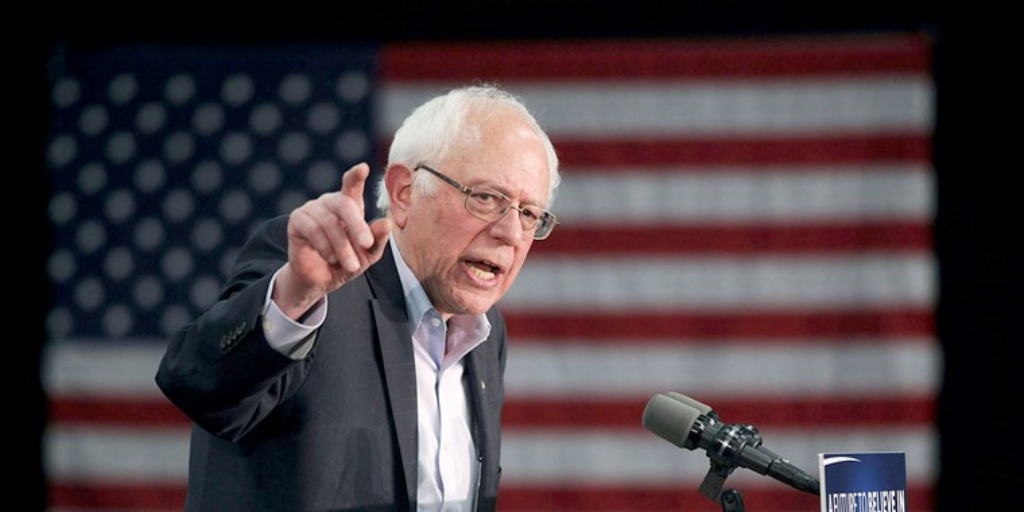
I read Matt Yglesias‘ overnight piece “Bernie Sanders showed us he’s a very skilled politician” with interest since, because he’s not a Sanders guy, the thesis is a confession against interests. It’s based on last night’s Democratic debate but is really about the power of branding and expectations.
Sanders’ most obvious vulnerability by far is that over the course of his two campaigns he’s centered a Medicare-for-all agenda that, while popular as an abstract slogan, tends to become politically dicey when people kick the tires and examine the details.
This has come up time and again at previous debates, but typically with Elizabeth Warren as the subject of scrutiny. Friday night it was Bernie’s time in the barrel as Joe Biden argued that Medicare for All “will cost more than the entire federal budget we spend now” so “the idea middle-class taxes aren’t going to go up is just crazy.”
It’s a tough charge and a fair one, but Sanders simply ducks it.
We are spending twice as much per capita on health care as do the people of any other country. Maybe it has something to do with the fact that the health care industry last year made $100 billion in profit. Maybe it has something to do with the fact that we are wasting $500 billion a year trying to administer thousands and thousands of different plans.
What Medicare for all will do is save the average American substantial sums of money. Substantial. It would be much less expensive than your plan. And we will expand Medicare to include dental care, eyeglasses, hearing aids, and home health care, as well.What makes this answer work is that while it’s evasive on the taxes point, it also stands up to fact-checking scrutiny.
[…]
Warren, who had a brand as the woman with a thousand plans, was expected to draw up a specific plan to make her health care vision work. What’s more, her whole campaign is vulnerable to attacks from the left from Sanders fans so she always had to worry about looking less-than-fully committed. Sanders is free of a wonk reputation or a need to worry about his left flank, so he doesn’t try to offer a specific health care financing vision — which, if he did it, would inevitably end up featuring some unpleasant tradeoffs.
Instead, he just makes the basic compelling point captured by that chart — America’s health care system is bizarrely terrible, providing less coverage at greater cost than what we see in comparable countries. This is not an adequate basis for actually enacting Medicare-for-all, but it’s a good political answer that explains his big picture view of health care without falling into nasty political traps.
There’s a lot more to the piece, and Matt makes some good points about Sanders being a smoother political operator than we sometimes give him credit for. But the above excerpt stood out to me because it answers a question that I’ve seen dozens of times in think pieces and my Twitter feed: why does Sanders get so much less scrutiny than Warren and Amy Klobuchar.
While the easy answer is that women are held to higher standard because, reasons, the better answer is that Sanders’ appeal is populist and theirs more technocratic. Democrats, much more than Republicans, tend to nominate wonks for the Presidency. Sanders is an anti-wonk. He’s mad as hell and isn’t going to take it anymore.
And the thing is, on this particular issue, Sanders is right. Every other civilized country on the planet manages to provide healthcare to its citizens while spending far less per capita to do it. So, the problem is absolutely solvable.
But, as Warren is finding out, translating that to actual policy platforms opens it up to scrutiny and draws fire. Moving from our system, flawed though it is, to any sort of universal coverage system is going to cause taxes to rise and lead to various inconveniences for various people, all of whom will rally against the plan. Sanders sidesteps most of that by not offering a plan.

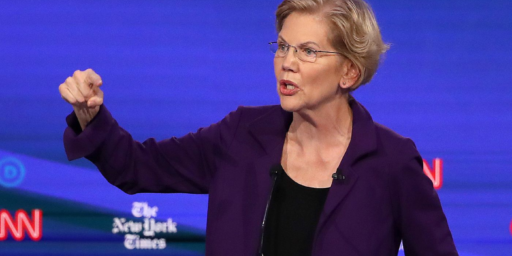
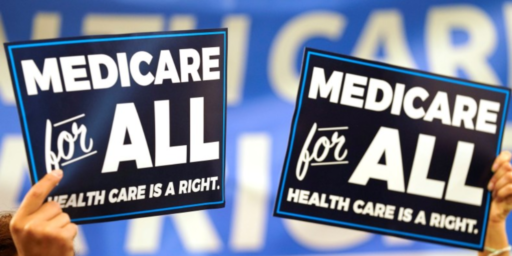
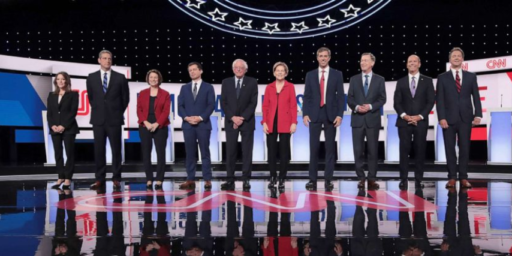
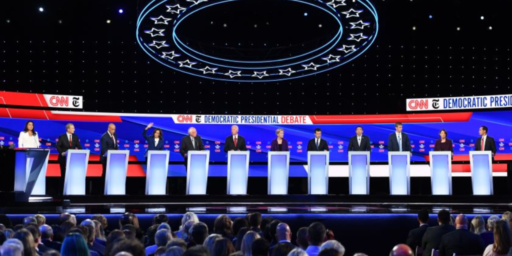
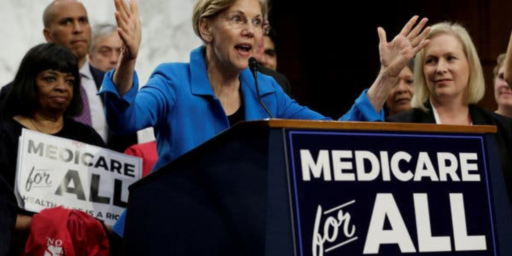
I listened to most of the debate (kids over) and thought most of them did well: Angry Grandpa, Gay Android, Active Granny, Minnesota Mean, they were all fine. Someone appeared to have sandblasted Barack O’Biden leaving only a mottled laminate on his face and doll hair on his head, and except for long periods when he evidently left to grab power naps, he was. . .well, he was there.
But someone needs to explain to Bernie that health insurance company profits are huge, but not huge enough to count for much next to the costs of health care. I haven’t heard him call for cutting the incomes of doctors, particularly specialists, which remains probably the single biggest expense.
Not that it matters, because as it is there is zero percent chance of us having 60 votes in the Senate, maybe 10% chance of getting to 50-51, which, according to the algorithm in my head means virtually none of the Sanders agenda is going to happen. And in this case by ‘virtually’ I mean, ‘literally.’ The entire Sanders agenda will be dead before his butt hits the Aeron chair in the Oval. So we’re debating fantasies now.
Steyer made the most consistent sense, and for a gadfly was the most directed and the most unifying. He seldom used ‘I’, more often, ‘we’ and seemed best attuned to what actual blue voters want.
One other downside to nonstop political coverage is that we never lack for people to tell us that whatever we are currently considering is impossible. Finding an un-dotted i makes some feel that they are running with the big dogs. Over the long run, the welter of uninformed opinions wears us all down, erodes trust in experts, and gives support to the status quo.
BTW, I think we’re over-stressing candidate’s abilities to beat Trump on the debate stage. Trump isn’t going to debate unless he’s very certain of an easy win. He’ll puss out and Cult45 will call it courage.
I can’t help wondering why he’s allowed to. Oh well.
As to his being a better politician than people give him credit for, right now he’s polling at 25%. This is a guy who had a 4-5 year jump on the rest of the field and yet 75% of DEMs think he’s the wrong guy. A little less than 4 years ago 43% thought he was the right guy. Granted, the 2 elections are different animals and one can’t make any strict comparisons. I would be loathe to try and say what it means because there are times when politics mystifies me, but…
I would have expected him to a have a little more of a cushion as opposed to tied with with a 2 term mid-sized city mayor.
@OzarkHillbilly: I think Sanders definitely has a ceiling with Democratic voters. I, for one, find him an older, dumber, and less likeable Warren. But his lack of specificity allows him to focus on his One Big Idea rather than get diverted into actual policy debate. While Reagan was more naturally wonky than Sanders, he largely did the same thing.
@Michael Reynolds:
Yup, and the reason the lefties should be supporting Warren. She’s shrewd enough to take what’s offered, declare victory and move on.
@OzarkHillbilly:
@James Joyner:
Bernie’s support has a natural cap, but unless the Dem field winnows quickly it maybe high enough to grab the nomination. Jame’s Reagan comparison is apt, though Bernie has never evidenced the ability to cut a deal and take part of a loaf.
At the Dispatch, David French had an interesting article on why Bernie can win.
Chris Matthews is not underestimating Bernie Sanders.
@Gustopher:
Chris Matthews could not analyze a tic-tac-toe game. The man is fixated on optics. He thinks GWB’s aircraft carrier speech was foundational because of the outfit.
@Michael Reynolds:
Steyer will get roughly 0.2 to 1% of the vote Tuesday.
@de stijl: Matthews went on an unhinged rant about executions in Central Park last night, in reference to Bernie Sanders, while the other MSNBC hosts looked on in embarrassed amusement. It was awesome.
@OzarkHillbilly:
That’s not how it works.
@Michael Reynolds:
A couple economists recently called healthcare spending in the US a poll tax which amounts to ~$8k per household.
A 2018 article in the American Journal of Public Health found that the structure of the healthcare system results in the bottom 10% subsidizing medical expenses for the rest. It also calculated that medical costs pushed about 7 million people into poverty in 2014:
Re: physician salaries:
Part of this is the debt burden of med school. Most graduates are well over 100k in debt from medical school alone, some way more than that. That’s not including undergraduate debt incurred, nor the cost of spending an extra four years in school rather than in the workforce.
Your claim that specialists make up the bulk of costs needs a citation.
—
I think Sanders using the phrase using insurance profits is more of a messaging strategy than the actual argument. Nobody wants to hear a candidate say this:
But having a system of multiple payers results in a rather large increase in administrative costs.
It may be harder to quantify, but a healthier population is a more productive population.
Plus, employer-based coverage may be tax deductible, but it is still an expense incurred by businesses.
You remember the comment from yesterday about Americans having opinions about subjects they know little about?
@Just nutha ignint cracker:
Yeah, definitely. I’ve thought a lot about physician salaries. Complaining about it makes little sense.
I don’t know about anyone else, but if compensation is positively correlated with productivity, I am okay with medical professionals making high salaries.
@James Joyner: @Sleeping Dog: He could win, I don’t discount that possibility, but he should be leading the pack by a fair margin. He isn’t.
@Kurtz:
Uh excuse me, yes it is. as I stated above:
Numbers don’t lie. They don’t always tell the whole truth but they don’t lie.
@Kurtz:
I haven’t seen a GP in decades, (bone surgeons yes, but not GP). My Nurse Practitioner has done a pretty damn good job of keeping me alive, but the “supervising physician”? I pretty much suspect she had very little to do with it. As far as I’m concerned, MDs are over paid while NPs and RNs are underpaid.
My .02 worth.
So Warren’s mistake is that she explains anything…it’s fascinating with both Democrats and Republicans how some politicians have to explain things to be taken seriously and then get pummeled for that while others can just throw out any kind of bullshit and seem to get a free pass…
@OzarkHillbilly:
Uh, excuse me, no it isn’t. In a large field, 25% support doesn’t equate to 75% evaluating a candidate as the wrong guy. If 75% of Dems thought he was the wrong guy, he would be no one’s second choice. That just ain’t the case.
Next time, don’t make an absurdly strong statement with no meaningful data behind it. Or if you don’t want to actually look at numbers, come up with something better than comparing a race with two people (+Carcetti) to one with 5-8. That is a basic ‘numbers’ mistake. Numbers may not lie, but methodology does.
Here are the numbers, are they lying?
Second choice polling shows Sanders as the leading second choice for both Biden and Warren supporters.
That’s one poll.
Quinnipiac’s poll has Warren as the leading second choice of Biden supporters.
As one would expect, the top second choice for Warren supporters is Sanders and vice versa. Notice whose name doesn’t appear as anyone’s second choice in either poll? Buttagieg.
Next time you want to be a jackass and start a post with “uh, excuse me” pick a different person or bring a bigger weapon.
@OzarkHillbilly:
That’s a good point. I could see a world where primary care providers are NPs rather than MDs.
Or as has been proposed before, if a physician wants to go into family practice, they only do three years of med school.
The savings for either of those would be miniscule compared to getting rid of the amount of overhead created by having a multi-payer system that creates opaque pricing, varying regulations depending on the payer, and shuts 20-30 million people out of the insurance market.
More on that third effect: one of the reasons emergency services has high overhead is because it is the primary point of contact for millions of people.
I suspect that most people think of Blue Cross and Aetna as healthcare companies rather than financial intermediaries, but I doubt they think of Geico as an automotive company.
@Kurtz:
The economists are using a bad metaphor. If it were a tax, it would be easy to redirect, but it’s a hodge-podge of different fees and payments by different parties, which means that any attempt to capture that money to pay for M4A is going to lose a lot of it, and result in a whole lot of winners and losers — which will translate into a massive opposition to M4A.
Some unions already oppose it and candidates that promote it — they sacrificed pay and other benefits to get good healthcare plans, and even if M4A was just as good, it means that the pay was sacrificed for nothing. People don’t like that.
It’s a lot like cancelling student loan debts in that respect.
@Gustopher:
That is absolutely no different from the status quo. And this is exactly the problem, and it highlights why many Democrats are no different from Republicans: IGMFY. This becomes quite clear when you realize that the union membership rate is 10.3%.
I stand by my arguments and data from above–both healthcare costs and student loans are problems that are much different now from what they were twenty years ago. In fact, on the latter, AARP has some data on student loan debt for those over 50.
As a reminder, IGMFY is an attitude that persists in both parties. Neither has the moral high ground unless one of them tells the people complaining to get over it. This is what happens when the political center is anchored so far to the right that anyone proposing solutions are decried as Stalinists.
@Michael Reynolds:
Trump is already too cognitively impaired (senile dementia) to debate. It will be a lot worse by September.
@James Joyner:
Sorry, I snorted my drink through my nose when I read that. Reagan was not more wonky than anyone this side of W. Reagan was all snake oil, no substance, with a side order of racism. It boggles me that anyone as intelligent as James could not have twigged to that by now.